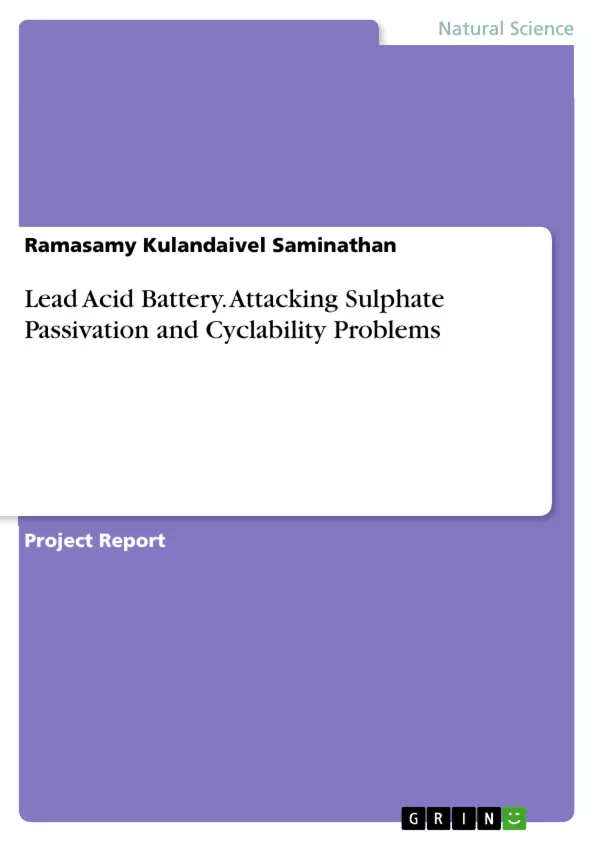
Lead Acid Battery. Attacking Sulphate Passivation and Cyclability Problems
Projektarbeit, 2006
263 Seiten, Note: 10
Leseprobe
Inhaltsverzeichnis (Table of Contents)
- INTRODUCTION
- 1. LEAD ACID BATTERY
- 1.1 Timeline of Battery History:
- 1.2. Characteristics of Some batteries and achievable performance:
- 1.3. Lead-acid battery
- 1.3.1. Advantages of lead-acid system
- 1.3.2. Technical developments in Lead-acid battery:
- 1.3.3. Charging and Discharging Reactions:
- 1.3.4. Theoretical voltage and capacity:
- 1.3.5. Capacity of a cell:
- 1.3.6. Thickness of the plates and capacity:
- 1.3.7. Rate of Discharge
- 1.3.8. Electrolyte Temperature
- 1.3.9. Effect of Concentration of the electrolyte:
- 1.3.10. Manufacture of Lead-acid battery
- 1.3.11. Flow chart for the Manufacture of flooded lead-acid battery
- 1.4. Classification of Lead-acid battery:
- 1.4.1. SLI batteries:
- 1.4.2. Stationary batteries:
- 1.4.3. Motive power batteries:
- 1.4.4. Special purpose batteries:
- 1.4.5. Valve Regulated Lead-acid Batteries (VRLA)
- 1.5. Failures in Lead-acid batteries:
- 1.5.1. Sulphation is due to the following reasons:
- 1.5.2. Shedding of the positive mass:
- 1.5.3. Destruction of the positive grids:
- 1.5.4. Defects in the negative mass:
- 1.6. CHARGING OF LEAD-ACID BATTERY
- 1.6.1. Constant-current charging (CC)
- 1.6.2. Constant-Voltage charging (CV)
- 1.6.3. Taper charging
- 1.6.4. Pulse charging
- 1.6.5. Trickle Charging
- 1.6.6. Float Charging
- 1.6.7. Battery charger should have the following Characteristics
- 1.7. GRID MATERIALS:
- 1.7.1. Grid alloy properties.
- 1.7.2. Ease of fabrication
- 1.7.3. Mechanical strength
- 1.7.4. Creep strength
- 1.7.5. Corrosion resistance.
- 1.7.6. Conductivity
- 1.7.7. Compatibility with active material.
- 1.7.8. High hydrogen and oxygen over potential
- 1.7.9. cost effective
- 1.7.10. Various Types Of Grid alloys:
- 1.7.11. Beneficial elements
- 1.7.12. Self discharge behaviour
- 1.7.13. Detrimental elements
- 1.8. GRID production methods:
- 1.9. VARIOUS TYPES OF GRIDS:
- 1. MC B-GRID
- 2. BOX-NEGATIVE PLATE
- 3. MONCHESTER GRID.
- 4. IRONCLAD GRID.....
- 6. EXPERIMENTAL BATTERY GRID.
- LITERATURE SURVEY AND SCOPE OF THE WORK
- 2.1 LITERATURE SURVEY:
- 2.2. SCOPE OF THE WORK
- EXPERIMENTAL DETAILS
- 3.1. Chemicals and materials used
- 3.2. Weight loss Studies
- 3.3. Cyclic Voltammetry
- 3.4. Impedance measurements.
- 3.5. Anodic polarisation studies
- 3.6. CHRONO AMPEROMETRIC STUDIES.
- 3.7. XRD
- 3.8. Scanning Electron Microscope
- 3.9. Charge acceptance studies.
- 3.10. cycle life test
- 1. cycle life test with low capacity battery
- 2. Heavy load endorsement test
Zielsetzung und Themenschwerpunkte (Objectives and Key Themes)
This book aims to provide a comprehensive understanding of lead-acid batteries, their strengths, weaknesses, and advancements. It delves into the history, chemistry, and construction of these batteries, focusing on the challenges and opportunities presented by lead-acid technology. The book also explores innovative approaches to improving the performance and cycle life of lead-acid batteries.
- The History and Evolution of Lead-Acid Battery Technology
- The Chemistry and Operational Principles of Lead-Acid Batteries
- Failures and Degradation Mechanisms in Lead-Acid Batteries
- Advanced Techniques for Charging and Maintaining Lead-Acid Batteries
- The Role of Grid Materials in Lead-Acid Battery Performance
Zusammenfassung der Kapitel (Chapter Summaries)
The first chapter presents a timeline of battery history, highlighting significant milestones in battery development. It then delves into the characteristics of various battery types and examines the advantages of lead-acid batteries in detail. This chapter further explores the chemical reactions involved in charging and discharging, the factors influencing battery capacity, and the manufacturing process. It concludes with a classification of lead-acid batteries and an overview of common failure modes.
Chapter two delves into the literature related to lead-acid battery research. It focuses on key advancements in battery technology, addressing critical challenges such as sulphation and grid corrosion. The chapter also outlines the scope of the research presented in the book, highlighting the specific areas of investigation.
Chapter three describes the experimental procedures and techniques used in the research. This chapter details the materials and chemicals employed, the methods for evaluating battery performance, and the analytical tools used to understand the underlying mechanisms of battery degradation. The chapter highlights the importance of weight loss studies, cyclic voltammetry, impedance measurements, and other techniques in understanding battery performance.
Schlüsselwörter (Keywords)
The key terms and concepts covered in this book include lead-acid batteries, sulphation, cyclability, grid corrosion, battery performance, charging techniques, grid materials, and experimental methods like cyclic voltammetry, impedance spectroscopy, and X-ray diffraction.
Details
- Titel
- Lead Acid Battery. Attacking Sulphate Passivation and Cyclability Problems
- Note
- 10
- Autor
- Dr. Ramasamy Kulandaivel Saminathan (Autor:in)
- Erscheinungsjahr
- 2006
- Seiten
- 263
- Katalognummer
- V373853
- ISBN (eBook)
- 9783668541511
- ISBN (Buch)
- 9783668541528
- Dateigröße
- 4205 KB
- Sprache
- Englisch
- Schlagworte
- lead acid battery attacking sulphate passivation cyclability problems
- Produktsicherheit
- GRIN Publishing GmbH
- Preis (Ebook)
- US$ 42,99
- Preis (Book)
- US$ 56,99
- Arbeit zitieren
- Dr. Ramasamy Kulandaivel Saminathan (Autor:in), 2006, Lead Acid Battery. Attacking Sulphate Passivation and Cyclability Problems, München, Page::Imprint:: GRINVerlagOHG, https://www.diplomarbeiten24.de/document/373853
- Autor werden
- Ihre Optionen
- Vertriebskanäle
- Premium Services
- Autorenprofil
- Textarten und Formate
- Services für Verlage, Hochschulen, Unternehmen

- © GRIN Publishing GmbH.
- Alle Inhalte urheberrechtlich geschützt. Kopieren und verbreiten untersagt.
- info@grin.com
- AGB
- Open Publishing
Der GRIN Verlag hat sich seit 1998 auf die Veröffentlichung akademischer eBooks und Bücher spezialisiert. Der GRIN Verlag steht damit als erstes Unternehmen für User Generated Quality Content. Die Verlagsseiten GRIN.com, Hausarbeiten.de und Diplomarbeiten24 bieten für Hochschullehrer, Absolventen und Studenten die ideale Plattform, wissenschaftliche Texte wie Hausarbeiten, Referate, Bachelorarbeiten, Masterarbeiten, Diplomarbeiten, Dissertationen und wissenschaftliche Aufsätze einem breiten Publikum zu präsentieren.
Kostenfreie Veröffentlichung: Hausarbeit, Bachelorarbeit, Diplomarbeit, Dissertation, Masterarbeit, Interpretation oder Referat jetzt veröffentlichen!
- GRIN Verlag GmbH
-
- Nymphenburger Str. 86
- 80636
- Munich, Deutschland
- +49 89-550559-0
- +49 89-550559-10
- info@grin.com
-









